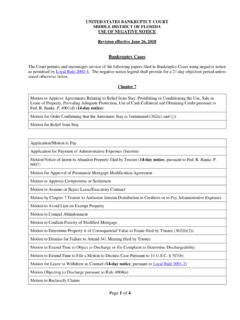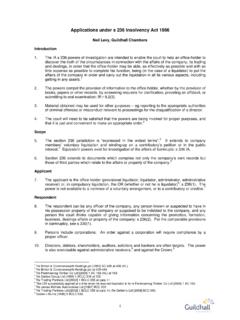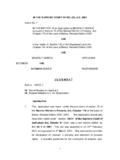Transcription of Case CCT 19/01 FIRST NATIONAL BANK OF SA LIMITED THE ...
1 CONSTITUTIONAL COURT OF SOUTH AFRICA Case CCT 19/01 FIRST NATIONAL BANK OF SA LIMITED t/a WESBANK Appellant versus THE COMMISSIONER FOR THE SOUTH AFRICAN REVENUE SERVICES FIRST Respondent THE MINISTER OF FINANCE Second Respondent and FIRST NATIONAL BANK OF SA LIMITED t/a WESBANK Appellant versus THE MINISTER OF FINANCE Respondent Heard on : 28 August 2001 Decided on : 16 May 2002 JUDGMENT ACKERMANN J: Introduction [1] This is a direct appeal, with leave of this Court, from the judgment and order of the Cape ACKERMANN J of Good Hope High Court1 (the High Court) dismissing a constitutional challenge by the appellant, FIRST NATIONAL Bank of SA LIMITED (trading as Wesbank) (FNB), to the provisions2 of section 114 of the Customs and Excise Act 91 of 1964 (the Act) in two High Court cases, Nos 825/99 (the Lauray-Airpark case) and 9101/94 (the Republic Shoes case)
2 Respectively. Although this Court has come to a different conclusion, the judgment of the High Court has been of much assistance in a complex matter. [2] FNB is a financial institution that sells and leases movables. Three motor vehicles of which it is the owner have been detained under the provisions of section 114 of the Act. The FIRST respondent is the Commissioner of the South African Revenue Service (the Commissioner) who is charged under section 2(1) of the Act with its administration. The second respondent is the Minister of Finance (the Minister) under whose aegis the Act falls. 1 Reported as FIRST NATIONAL Bank of SA Ltd t/a Wesbank v Commissioner for the South African Revenue Service and Another 2001 (7) BCLR 715 (C); 2001 (3) SA 310 (C). References in this judgment will be to the South African Law Reports.
3 2 Its provisions are quoted in para 11 below. 2 ACKERMANN J [3] The two cases were consolidated for hearing in the High Court. In the Republic Shoes case it was common cause that FNB s cause of action had arisen before 27 April 1994, the date on which the interim Constitution came into force. The High Court accordingly correctly held, on the strength of the judgment of this Court in Rudolph and Another v Commissioner for Inland Revenue and Others,3 that FNB could not validly base a challenge on either the interim Constitution or the 1996 Constitution4 and that the substantive dispute in this case fell away.
4 The only issue on appeal in the Republic Shoes case is the costs order made in the High Court. Unless the contrary is indicated, all references in this judgment will be to the Lauray-Airpark case. 3 1996 (7) BCLR 889 (CC); 1996 (4) SA 552 (CC). 4 The Constitution of the Republic of South Africa 1996. 3 ACKERMANN J [4] The Act provides for the levying of customs and excise duties and a surcharge; for a fuel levy and for an air passenger tax; the prohibition and control of the importation, export, manufacture or use of certain goods; and for matters incidental thereto.
5 5 It is primarily a fiscal measure and has counterparts in countries throughout the world. Section 114 is concerned with the collection of debts (customs debts) due to the state by the debtor (customs debtor) under the Act. For the purposes of this case, and at the risk of oversimplification it is helpful to emphasize two features of the provisions of section 114 at this stage. The FIRST is that, in order to collect the debt owed, they allow the Commissioner to sell goods without the need for a prior judgment or other authorisation by a court. The second is that, in order to satisfy the debt owed, the Commissioner may sell goods even where the goods do not belong to the customs debtor but to some third party. [5] FNB contends, as it did in the High Court, that section 114 of the Act constitutes an unjustified infringement of its constitutional rights to have access to the courts in the settlement of disputes,6 to the protection of its property7 and to its freedom to choose a Save for the constitutional attack, the entitlement of the Commissioner in terms of section 114 of the Act to act as he has done in this case is not in dispute.
6 5 Its long title. 6 Section 22 of the interim Constitution and section 34 of the (1996) Constitution, quoted in paragraph 116 below. 7 Section 28 of the interim Constitution and section 25 of the (1996) Constitution, quoted in paragraph 25 below. 8 Section 26 of the interim Constitution, quoted in n 104 below and section 22 of the (1996) Constitution. 4 ACKERMANN J [6] The format of this judgment is as follows: The factual background: paras 7 to 10. Section 114 of the Act: paras 11 to 18.
7 Goods subject to detention and sale under section 114: paras 19 to 23. The property challenge. Introduction: paras 24 to 40. The property challenge issues: paras 41 to 46. The meaning of Section 25: Introduction: paras 47 to 50. The meaning of property in section 25 as applied to the present case: paras 51 to 56. The approach to deprivation in the context of section 25: paras 57 to 60. The meaning of arbitrary in section 25: Introduction: paras 61 to 70. Comparative law on deprivation of property: paras 71 to 99. The conclusion reached on the meaning of arbitrary in section 25: para 100. Arbitrary deprivation as applied to section 114 of the Act: paras 101 to 109. Justification: paras 110 to 113. The appropriate relief: paras 114 to 115. The section 34 access to court challenge: paras 116 to 118. 5 The other challenge: para 119.
8 ACKERMANN J Disposal of the appeals: paras 120 to 131. The order : paras 132 to 133. The factual background [7] FNB, acting in the normal course of its business, leased a Volkswagen Jetta to Lauray Manufacturers CC ( Lauray ) in November 1994 and a Volkswagen Golf to Airpark Cold Halaal Storage CC ( Airpark ) in November 1995. In January 1996 FNB sold a Mercedes-Benz to Airpark under an instalment sale agreement with reservation of ownership until the last instalment was paid. Appellant thus remained the owner of all three vehicles.
9 [8] On 16 February 1996 the Commissioner detained, and thereby established a lien, over several vehicles on Lauray s premises in terms of section 114 of the Act. One of these vehicles was the Volkswagen Jetta. This was done in order to obtain security for approximately R3,26m9 comprising predominantly of outstanding customs duty, penalties and payment in lieu of forfeiture arising out of an alleged fabric smuggling network. Lauray was placed in provisional liquidation on 17 November 1997. On 18 December 1997 the liquidator cancelled the lease. The Commissioner lodged a claim with the liquidator and received an amount of R198 074,96. Appellant did not lodge a claim for the arrears in lease payments since it would have been treated as a concurrent creditor in circumstances where there was no prospect of a dividend for concurrent creditors.
10 The Commissioner has indicated, subject to the outcome of these legal proceedings, that he intends selling the vehicle in order to satisfy the outstanding customs debts 6 9 The High Court found (above n 1 at 314I) that Lauray owed R3,26m to the Commissioner by 10 June 1996, but this should probably read 10 January 1996. ACKERMANN J of Lauray. Lauray was originally allowed to use the Jetta after detention, but it has been stored in a state warehouse since 27 March 1998.
















